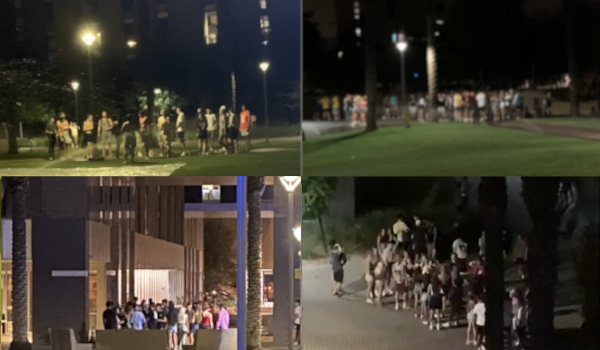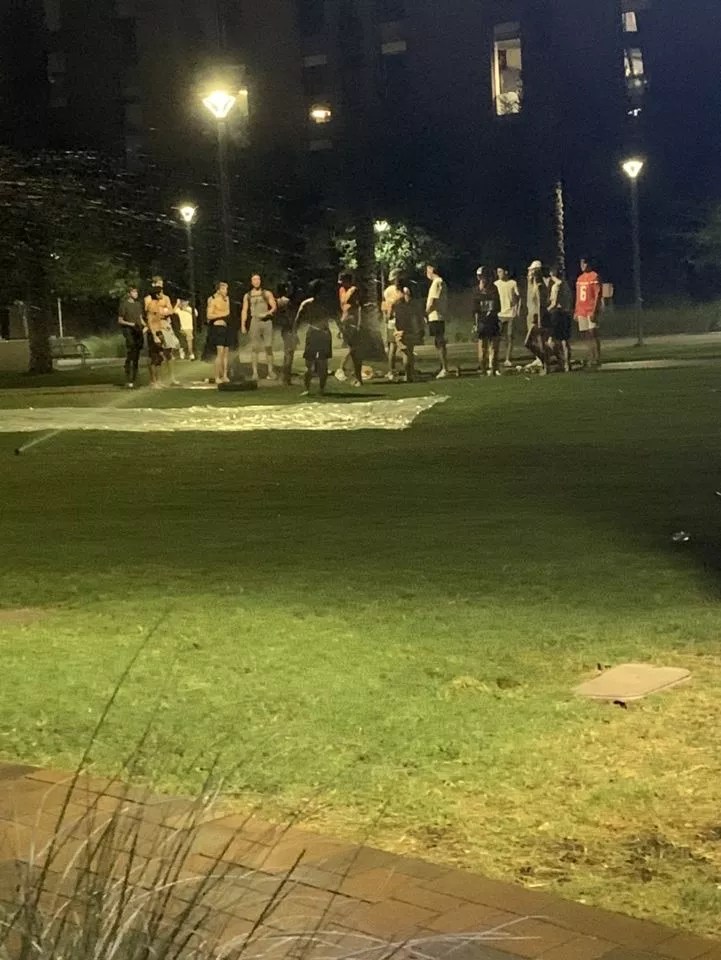
Composited by Erasmus Baxter

Audio By Carbonatix
Arizona State University hadn’t even completed a full week of classes when President Michael Crow announced yesterday that there were 161 positive COVID-19 cases across the university’s four campuses.
The numbers include both on-campus and off-campus students. But they came as little surprise to those tasked with looking after the 13,000 students currently living on campus.
Six community assistants tell Phoenix New Times that a number of students have been packing into dorm parties, gathering in large clusters to head to off-campus parties, and playing close-contact sports – all while flouting mask mandates. The student employees asked to remain anonymous because they’re worried about losing their jobs or facing other repercussions for speaking out. At least one said supervisors had threatened termination for speaking to the media.
“I’ve been busting a lot more parties than last year,” said one second-year community assistant, or CA – ASU’s version of a resident adviser – who has encountered up to 20 people crammed into one room for a party.
Another said he’d busted a 20-person party with attendees from multiple other residence halls as well as off-campus residences. He said a group of 20 to 30 students had been gathering in a huddle between two residence halls around midnight each night, in what he described as an almost “cult-like” ritual.
It’s not just unofficial gatherings that have been an issue. Some community assistants have been skipping meals due to crowding in the dining halls as students pick up their take-out meals.
“It’s frustrating because I want fresh vegetables,” said one assistant who has been buying meals from a campus convenience store instead.
Another CA went on a 40-person gym tour that involved the group maneuvering through close quarters and crowding around the person giving the tour, she said.
While ASU and Crow have promoted the university’s COVID-19 procedures – physical distancing requirements, mask-wearing, mandatory testing – as a way to offer a safe return to campus, the lack of institutional backing means the university’s COVID-19 measures amount to empty promises, the assistants said.

Students cluster on the ASU campus on August 17.
Courtesy of an ASU student
“If everyone follows the guidelines in our Community of Care plan, wears a mask, social distances, (completes the) health check, testing if you’re showing symptoms, we’re not going to have any problems,” university president Michael Crow told the student newspaper, The State Press, two weeks ago in a quote that has since appeared in at least two articles about students apparently attending off-campus parties.
In his most recent release, Crow said that cases were expected as testing proceeded and the university has experience with isolating students as necessary.
After the videos of students at off-campus parties surfaced last week, the ASU Community of Care Coalition, a campus group concerned about the reopening, told New Times last week that ASU should reconsider its reopening plans instead of blaming students.
“The behavior seen in these videos makes abundantly clear what common sense should have dictated to ASU leadership in the first place: efforts to enforce consistent student social distancing and mask-wearing will fail,” the group wrote. “ASU should not continue to risk the health of students, employees, and the broader community.”
Universities across the country are seeing hundreds of COVID-19 cases among students after re-opening – many after students flocked to bars or parties. Some experts have argued that opening college campuses is a recipe for disaster.
ASU’s dean of students for the Tempe campus, Cassandra Aska, told New Times that everyone is adjusting and the goal is to remind students about and to reinforce rules around masks and physical distancing. She emphasized that it was still early in the school year and said adjustments can be made as needed if administrators are notified.
“School has just started and we’re seeing, for the most part, people are wearing masks, but when individuals are being seen not wearing their masks, the first thing is we educate them,” Aska said, adding that she walks around campus and reminds people to put their masks on. Community assistants can write up students not following the policies and refer them to the university’s discipline system, she said.
But there’s been confusion about those policies.
According to two training documents reviewed by New Times, community assistants were initially told that no visitors were allowed in dorm rooms at all. When a parent complained about the policy, Joanne Vogel, the university’s vice president for student services, told the parent in an email that community assistants who enforced the no-visitors rule were providing inaccurate information based on their “personal beliefs that students should be minimizing or eliminating contact.” Vogel added that it would merely be “smart” for students to wear face coverings when visiting others.
“No bait and switch here – only overzealous students,” Vogel wrote in the message, referring to the CAs.
In a later email, Vogel clarified that the inconsistent messaging regarding the rules was actually the result of a miscommunication between housing administrators, and not the fault of the CAs. But the damage was already done. After Vogel’s response was shared in an ASU-parent Facebook group, a number of students sent it to their CAs, leaving them feeling thrown under the bus for following instructions. Within 24 hours, the CAs were pulled in to a Zoom meeting on half-hour notice and informed the new policy was to allow visitors as long as they all lived in the same dorms.
This was around a week ago. Community assistants say the more lenient policy has reduced their ability to enforce physical distancing and mask requirements as students gather behind closed doors. Some have been told by supervisors to avoid writing up students for violations of the visitor policy due to the lack of clear policy, or to only address violations if there were other issues such as alcohol use.
“For the last week we haven’t really been able to enforce COVID policy,” said one assistant.
Asked about this, Aska said if students are not wearing their masks in public areas or are in residence halls they don’t live in, community assistants are supposed to document that, and then the violation will go through the disciplinary process.
“That is the protocol, that is the policy – that they get documented,” she said.
In his message about the case numbers yesterday, Crow emphasized that face coverings are required at all times besides when eating and that students who gather without following health protocols or violate the visitor policy are subject to suspension. An ASU spokesperson said that anyone who sees students clustering in shared spaces should report them to the dean of students office.

Students gathered around a slip-and-slide Tuesday night. ASU’s president announced there were 161 cases associated with the university the same day.
Courtesy of an ASU student
Community assistants, many of whom rely on their job for housing and receive less than $120 a month in compensation apart from food and board, say they’re in a difficult situation. They know there are COVID-19 cases on campus and they’ve heard through the grapevine that at least one community adviser is isolating after exposure. At the same time, ASU will not tell them where the cases are, and their contract requires them to engage with residents in person and conduct patrols for violations. That means entering dorms crowded with maskless students to break up parties.
In fact, the university has actually increased the number of responsibilities that bring CAs into contact with students since last year. CAs must now work five hours a week manning the front desk after the university eliminated what had previously been a separate job. Assistants are also required to “volunteer” to help students move into the dorms, which this year has often meant interacting with unmasked family members dropping their students off. (Dean Aska said the university told parents they would have to follow campus guidelines, including wearing masks, while dropping students off.)
While ASU has trumpeted the fact that students had to have tested negative for COVID-19 in order to return to campus, out-of-state students were allowed to present tests from a week ago or more – even from before they flew to Arizona and were potentially exposed in the process. (An ASU spokesperson said he believed the window for test results was two weeks before arriving at campus, but could not confirm for sure by press time.)
Community assistant’s contracts – sent just a few weeks before they returned to campus – call for them to only work 20 hours a week. But one of the CAs showed New Times a spreadsheet where she documented working around 70 hours a week over the two weeks of the move in, including her eight-hour on-call shifts. It also took several days for the university to begin providing water to the assistants working in the heat, she said.
What was once weeks of training for assistants was crammed into a few days to facilitate the lengthened move-in process. The assistants who spoke with New Times said that questions and concerns were either left unanswered or met with hostility.
“If you don’t feel comfortable, you should leave,” is how one assistant summed up the administration’s message in response to concerns. Some student employees already have. But others say they need the job and housing to continue attending school.
Dean Aska said that community assistants can raise issues or concerns with her staff and housing leadership. She said they’re also welcome to bring any issues directly to her office.
When questioned as to whether assistants with concerns should resign, Aska said, vaguely, that the community assistant program is a professional development program and the school wants to support assistants in figuring out that decision for themselves.
ASU spokesperson Fiscus said that there had already been some meetings between students and administrators.
“Through this whole process it’s good that we’re hearing from everybody, because sometimes they have misinformation, and sometimes they have information that’s really valuable that we can follow up on, and this is an evolving thing,” Fiscus said. “So you know we can make tweaks and adjustments as necessary.”
In the meantime, community assistants are hanging on, doing their best to try and stay safe. One said he’s getting tested for COVID-19 three to four times a week.
“I’m doing everything I can to not be the person who infects a resident,” he said.